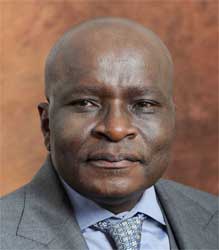
Top stories

Marketing & MediaBehind the campaign: Reframing fairness in ride-hailing: The inDrive success story
inDrive 3 hours





More news

















The two-day symposium will bring together key stakeholders in the industry and give them an opportunity to improve South Africa's mining sector amid fierce competition from other countries.
Issues of transforming the industry and making it more responsive to the context within which it operates are prominent on the agenda. In his opening remarks at the lekgotla, Mineral Resources Minister Ngoako Ramatlhodi said given mining's importance to the South African economy, mineral wealth has to be used to benefit the majority of the people.
Mining contributes substantially to SA's gross domestic product (GDP). It is identified in the National Development Plan (NDP) as one of the industries that has big potential to contribute to economic prosperity and job creation.
"The NDP sets out the objectives of the country, which has also identified mining as a key contributor to the fulfillment of the socio-economic goals. Mining can contribute to economic prosperity, job creation and transformation," said Ramatlhodi.
Chamber of Mines President Mike Teke confirmed the mining industry's commitment to help government meet its growth objectives, saying it would contribute towards the creation of jobs.
Recently, mining has been besieged by lengthy industrial action, notably in the platinum sector, as worker laid down demands for better wages and benefits including housing. Calls have been reiterated for the living conditions of miners in mining communities to be rapidly improve.

"As matters stand, transformation has delivered varied results. While the review process on the implementation of the Mining Charter is still underway, initial results suggest that whatever compliance we may have achieved, much more still needs to be done," Ramatlhodi said.
The Mining Charter was developed as a way to transform the industry. The charter is accompanied by a scorecard with clear targets for change. One of the requirements of the charter is for mining companies to implement ways of improving housing and living conditions of mineworkers.
"Transforming the current living conditions in mining communities for workers is even more pressing," Ramatlhodi said..
"We need workers' confidence and this will only be achieved once they see a material change. This and only this can guarantee the long-term stability and sustainability of the mining industry. Rising tensions between mining companies and communities bear testimony to the urgent need to do things differently," Ramatlhodi claimed.
"The department pledges to support all progressive initiatives aimed at making black South Africans real stakeholders in the mining sector, not only under the law but in actual fact," said Ramatlhodi.
He went on to say that the Department of Mineral Resources attributes significant importance to skills development and to this end the department will undertake to enhance its collaboration with the Department of Higher Education and Training and other departments to improve skills development in the sector.
SAnews.gov.za is a South African government news service, published by the Government Communication and Information System (GCIS). SAnews.gov.za (formerly BuaNews) was established to provide quick and easy access to articles and feature stories aimed at keeping the public informed about the implementation of government mandates.
Go to: http://www.sanews.gov.za